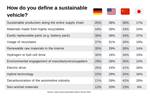Plataine publishes composite industry survey results
Survey findings provide insight from industry players as they navigate global manufacturing challenges and uncertainties, and sustainability and digitalization implementation.
Photo Credit, all images: Plataine
Final results have been released for the industry survey, “Challenges and Trends in Advanced Manufacturing,” launched by Plataine (Waltham, Mass., U.S.) and distributed by CW. The survey aims to provide insights into certain aspects of the composites industry, particularly the challenges faced by manufacturers, and the strategies embraced by leading companies to overcome these issues. The free report includes some revealing insights into recent market changes and the impact of recent AI technology advancements.
When taking the survey, applicants were assessed on topics including manufacturing challenges and technology adoption, Industry 4.0, sustainability, growth outlook, as well as more general demographic info, to best capture the state of global manufacturing.
Respondents — OEMs and Tier 1s make up the bulk of them — are predominately positioned in aerospace and defense (75%), with automotive (38%) and other (38%) the next two majorities. Most respondents are located either in North America (55%) or Europe (28%).
The survey captured several prevailing trends in global manufacturing. These include the impact of inflation on production costs, labor market challenges and the uncertainty surrounding supply chain stability. Fifty-seven percent of respondents agree that new manufacturing processes and automation is the way forward while 42% think that improving inventory control and material procurement is the solution.
Related to these challenges is the state of digital transformation (e.g., AI, IoT, data analytics). Companies varied — some respondents noted significant progress in leveraging these technologies, while others are still in the early stages of implementation. Specifically, OEMs and Tier 1 segments lead in the digitization level at 20% and 60%, respectively. Tier 2 and Tier 3 are mainly investigating technology and use cases.
“How would you assess the potential impact of Digital Transformation in the following areas?”
The survey also explored the efforts made by companies to meet sustainability goals, such as reducing carbon emissions, optimizing material use and implementing circular economy practices. Forty-five percent of respondents said they’ve heard about plans to regulate manufacturing processes but don’t feel the pressure of improving sustainability at their facility; 30% note no pressure at all. These sentiments spanned from small to large companies.
When asked for a growth outlook in the next three years, an overwhelming majority expected growth in some forth, particularly in the double digits.
For a more detailed look, survey results can be downloaded for free .
Related Content
-
ST Engineering MRAS presents initiatives to drive autoclave efficiency, automation
During a JEC World 2024 panel discussion, the company revealed ways in which it is maximizing throughput and efficiency of its autoclaves and enhancing composites production processes.
-
Siemens software chosen for JetZero BWB aircraft concept, launches Xcelerator updates
Aviation startup will use the Xcelerator platform to achieve its aircraft vision. Other Siemens collaborations deliver software additions to deliver, democratize industrial AI for small companies, startups.
-
Wichita State, Dassault Systèmes open Manufacturing Innovation Center
Aviation companies of all sizes will be able to improve their resilience and efficiency via the center’s virtual design, automation and additive manufacturing capabilities.






